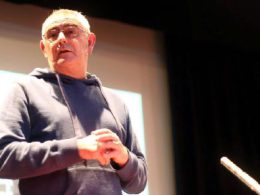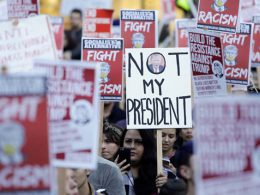By James McCabe
Across the globe, governments are introducing sweeping curtailments of basic democratic rights in the name of tackling the Covid-19 pandemic. In some countries this has even led to the “temporary” dissolution of parliament. Many governments have thankfully, if belatedly, enforced the closure of non-essential businesses. At the same time, many have banned public gatherings and given the police extra powers to arrest people. Some questions therefore need to be asked: are these extended powers necessary, and will they be temporary?
Emergency legislation
The new emergency law introduced by the Fine Gael-led caretaker government gives the Gardaí the power to arrest a person they deem to have breached the physical distancing rules. The arrested person can then face a fine of €2,500 and a prison sentence of up to six months. In what the Sunday Business Post has described as “measures akin to a police state”, the legislation allows for new offences to be created and the powers of Gardaí extended without even a vote or a debate in the Dáil. Included in the law is the ability of people to be confined in their home with effectively no right to appeal or recourse for even a court hearing.
In the context of a panel discussion about the new law on the Weekend on One show last Sunday, John O’Keeffe, the editor of the Garda Review publication called for the suspension of human rights for the duration of the pandemic, live on air.
Voluntary compliance with physical distancing
Widespread physical distancing is an effective way of slowing down the transmission of the virus, and the mainstream media have gone to great lengths to exaggerate the supposed flouting of physical distancing rules with anecdotal and sensationalist tales of “Coronavirus coughing challenges” by teenagers, etc. Iit should therefore come as no surprise that 95% of people in a recent Red C poll agree that “the government should have the power to stop people from moving around to suppress the spread of the virus.”
However, as the seriousness of the virus has seeped into popular consciousness, the overwhelming majority of people are voluntarily practicing physical distancing on a strict basis. Official data shows that traffic levels fell far below Christmas Day volumes on the M50 last Saturday after the lockdown was announced late on Friday 28th. A visit to any street in Ireland over the past week would also demonstrate that people who are outside on walks or jogs are often stepping into the middle of the road to avoid oncomers and maintain the recommended physical distance of two metres.
The very small minority who refuse to comply with physical distancing rules could be arrested under pre-pandemic (draconian) laws such as the Public Order Act or the Offences Against the Person Act. It’s actually in workplaces across the country where the rules are being flouted in the main, largely due to bosses pressuring workers to operate in cramped or crowded spaces without sufficient PPE.
State puts profits before healthcare
In response to O’Keeffe’s assertion that “we need to just park human rights for a moment”, Dr. Mick Molloy, consultant in Emergency Medicine for the HSE argued, “to introduce behavioural change we have to go back to when we were children and we had to be shown an example. We needed to be policed for it and developed behaviour as we went along.”
Instead of infantilising working-class people and defending the dissolution of civil liberties, Dr. Molloy would be better off making other recommendations for how the Irish population could look after their health, such as the introduction of mass testing which the state has so far failed to implement. Not to mention the scandalous shortage of PPE clothing for frontline health workers.
The reality is that despite what highly-paid civil servants like Dr Mick Molloy think, the capitalist state is not some benevolent or even neutral organisation. The record has thus far shown that with few exceptions, capitalist states have in fact prioritised profit-making over public health. While the Irish state may contrast favourably with some the responses of particularly reckless governments such as the rightwing administrations in the US, Britain or Brazil – the caretaker government and unelected senior civil servants of this state did delay in taking the necessary action and allowed businesses to operate as usual for weeks after the first confirmed infection on February 29, putting tens of thousands of lives at risk to maintain a profitable economy.
Although they eventually requested that non-essential businesses close for the duration of the lockdown, many continue to operate. Companies like Ferrero, Bausch and Lomb, and Alcon, among others, have continued to operate in violation of the restrictions despite being classified as non-essential businesses.
Ban on the right to protest
The new law also bans public gatherings of more than four people who do not belong to the same household. This amounts to a ban on protests and demonstrations that could extend beyond the summer, potentially up to November. At the same time, the government voted down an amendment (put forward by Socialist Party member MIck Barry TD) which would have extended the ban on evictions and rent freezes that were introduced beyond the three-month time frame contained in the current bill. Therefore, any would-be group of more than four people who protest against an eviction in four months’ time could receive a six-month prison sentence if the Gardaí claim they were breaching physical-distancing rules.
The government will likely introduce an emergency austerity budget before November in the context of the economic downturn. As per usual this will facilitate a transfer of wealth from working class people to big business and the super wealthy. The new emergency legislation will allow the Gardaí to deem protests or strikes against such a budget an illegal public gathering.
Of course, no one is likely to organise a protest that puts anyone’s health at risk. On the contrary, workers are protesting to protect their health and safety. Nurses in New York, Illinois, Georgia and California all held mass protests in March, calling for more PPE while maintaining physical-distancing of over two metres at every stage of their actions, according to the National Nurses United union.
In Italy, many workers were forced — in order to protect their health – to organise protests to close non-essential workplaces that remained open. This could easily be replicated here, and with this new legislation, we could face the outrageous scenario of workers being fined or imprisoned for protesting against being forced into large groups in their workplaces — because the protest, but not the workplace, is considered a breach of physical distancing!
Dangerous precedents
The southern Irish state is not alone in its subversion of civil liberties as a response to the Covid-19 pandemic. In Portugal, the parliament has voted to ban strikes, with the Left Bloc unfortunately voting in favour and the Communist Party abstaining, elevating the interests of big business over working people. The populist-right Fidesz government in Hungary has suspended parliament and given prime minister, Victor Orban, sweeping new emergency powers to rule by decree for an indefinite period. Essentially, freedom of the press has been eliminated as this emergency legislation carries penalties of up to five years in prison for anyone deemed to be spreading (what he considers) intentional misinformation.
Over the past week, Orban’s administration, backed up by pro-government media, has accused independent media outlets of spreading “fake news” for criticising the government over its failure to provide PPE gear for nurses and doctors according to the International Press Institute. Orban has also used the crisis situation to attack trans and non-binary rights and enshrine his party’s backward views on gender into law. The law stipulates that gender should be defined as “biological sex based on primary sex characteristics and chromosomes”. The new law will record a person’s “sex at birth” in the civil registry, and make it impossible for someone to change their legally recognised gender. A number of state governments in the US have used the pandemic to pursue their anti-choice agenda by classifying abortion services as “non-essential” or “non-urgent” healthcare. An organised fight back is needed by working-class and oppressed people to resist these bigoted attacks!
Discredited police force
In response to criticism of his statement by some of the other panellists on the Weekend on One, John O’Keeffe argued, “I guarantee you there are more people listening to this programme who are aggravated by this quasi-academic conversation than by the reality that is on the ground. This is Dublin 4, this is not Ireland. This is not what people are thinking and quite frankly human rights can be parked for now.” Despite what he may say, the best interests of working people are served by defending the right to assembly.
At the moment a majority of people see the new law as a necessary evil. However, does John O’Keeffe think working people forget that the last two Garda commissioners were forced to resign amid scandals of corruption, illegal phone tapping, politically-motivated spying against anti-water-charges activists and vicious witch hunts of Garda whistleblowers? Are we supposed to place our trust in this force to act with political impartiality?
New forms of “policing”
O’Keeffe’s comments acquired an insidious quality when it became apparent later in the week that senior Gardaí have placed an order for 16,000 “spit hoods”. Spit hoods are a form of equipment that are forcibly put over the head of an individual who police believe may be liable to spit or cough on them. Amnesty International have described spit hoods as “cruel and dangerous”.
Liam Herrick, executive director of the Irish Council of Civil Liberties wrote a letter to the Garda Commissioner, arguing that this decision should be reversed and suggesting that the number of hoods ordered shows “an intention to use them far into the future.” Herrick posited that the use of spit hoods by police in Britain has resulted in serious injuries and, in some cases, deaths. The pandemic should not become an excuse to introduce new cruel and unusual punishments.
The role of the capitalist state
Even if we accept that the police force simply acts to uphold the law, the laws favour the interests of big business and the super-rich, not working-class people. The judges, the police, the armed forces and senior civil servants certainly don’t “stand above” politics. To create an aura of impartiality – and under pressure from the working class – the labour courts may even sometimes find in the interests of workers, but on balance the record shows that the Irish state’s main function is to safeguard the wealth and resources of the ruling class and big business. For example, when the Free State Dáil first convened in September 1922, one of its first aims was to crush the 26-county wide postal workers’ strike. From the get go, this state set about enforcing the rule of the capitalist class through violence and intimidation. Shop stewards were arrested, union offices were raided and armoured cars were driven at speed at picket lines. Then in 1923, 600 troops were sent to Waterford to suppress a county-wide strike of farm labourers there.
Senior civil servants are unelected and hand-picked to ensure that they’re ideologically committed to defending the status quo along with being paid the types of salaries that guarantee that they’re kept out of touch with the living standards and outlook of working people. The current Garda Commissioner is on a salary of €250,000, while the chief executive of the HSE is due to increase his salary to €350,000 this month. Holding publicly unaccountable positions, these technocrats develop a bureaucratic and paternalistic outlook. Senior civil servant, Martin Fraser (Secretary General of the Dept of the Taoiseach since 2011), emailed all TDs to argue that the Dáil shouldn’t meet earlier this week. Eventually a majority of TDs decided that the Dáil should meet despite the protestations of Fraser. However, all the care-taker government ministers refused to answer any questions that were put to them.
Similarly, in a press conference after the Dáil session, journalists were not allowed to ask questions that were not submitted in advance. These unelected civil servants and caretaker ministers are using the crisis to avoid public scrutiny. For instance, all the details of the new deal that was agreed last week between the state and commercial hospital owners have been kept secret. How much public money is being given to billionaire Denis O’Brien in compensation for the use of his Beacon Hospital, for instance? Public scrutiny and democratic accountability are more important at a time of crisis, not less.
Temporary measures?
Emergency legislation such as the Offences Against the State Act that was brought in under the guise of tackling the IRA campaign was later used to criminalise trade unionists, student activists and anti-water-charges activists. The argument that the new emergency powers introduced here are temporary does not hold water. In France, a state of emergency suspending freedom of assembly was introduced in 2015 following terror attacks in Paris. The state of emergency lasted for two years, but was then replaced by a draconian anti-terror law in October 2017, which gave French police the power to carry out arbitrary searches of private homes and collect and store all electronic, email and telephone data of anyone police believe could potentially be connected in the present or future to “serious crime”.
The beefed-up police powers have seen an escalation of police repression against protests across France. Since 2018, dozens of “Yellow Vest” movement protesters have lost eyes to bean bag bullets or hands to police grenades. In the space of one day in December 2018 almost 9,000 people were detained in the greatest number of mass arrests in French history since the Nazi Occupation. Macron even ordered the army to fire live rounds on protesters in March last year – the first time this happened since a major strike wave in 1947.
The coming period of capitalist instability will see attacks on the pay and conditions, health and safety and general living standards of working-class people. Socialists call on trade unions, students’ unions and civil liberties’ advocacy groups to organise to defend and extend democratic rights at this time of crisis.
Challenging the power of the capitalist state can seem daunting. However, the economic impact of large numbers of workers withdrawing from economic activity underscores that working-class people create all the surplus value in society through our labour. Not a wheel turns, a phone rings, or a lightbulb shines without the permission of the working class. We are the real wealth creators. Therefore, if working people get organised and arm ourselves with a programme for radical socialist change, we can not only challenge the state but break with capitalism to organise socialist planning for the health and wellbeing of humanity and the planet.

